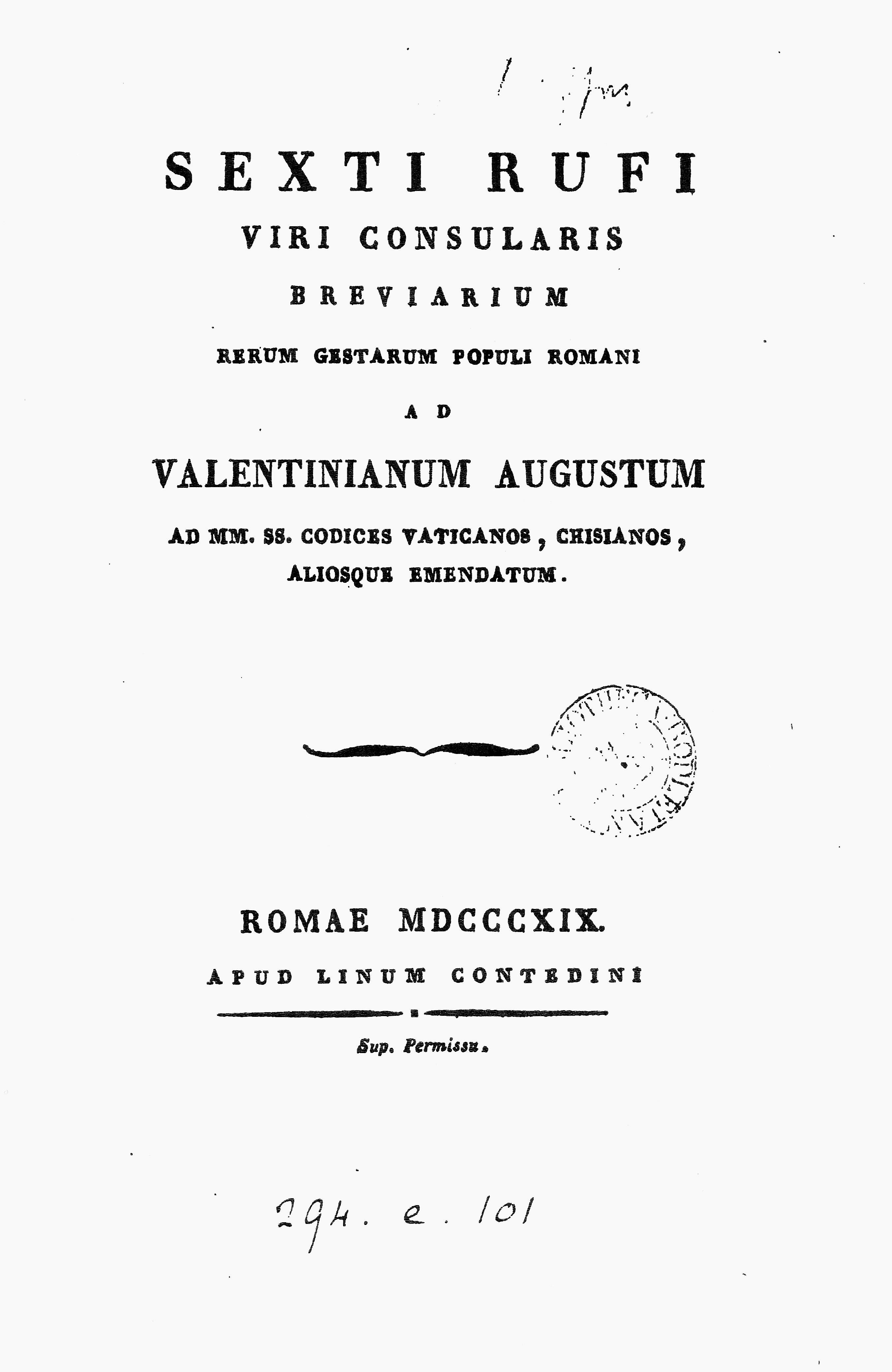Festus (historian) on:
[Wikipedia]
[Google]
[Amazon]
 Festus (), whose name also appears in the manuscripts of his work as Rufus Festus, Ruffus Festus, Sextus Festus, Sextus Rufus, and Sextus, was a Late Roman historian and proconsul of
Festus (), whose name also appears in the manuscripts of his work as Rufus Festus, Ruffus Festus, Sextus Festus, Sextus Rufus, and Sextus, was a Late Roman historian and proconsul of
Sextus Rufus
in Smith's ''Dictionary of Greek and Roman Biography and Mythology'' * * Roman governors of Asia Ancient Roman proconsuls 4th-century Latin writers Latin historians 4th-century historians {{AncientRome-bio-stub
Asia
Asia (, ) is one of the world's most notable geographical regions, which is either considered a continent in its own right or a subcontinent of Eurasia, which shares the continental landmass of Afro-Eurasia with Africa. Asia covers an ...
whose epitome ''Breviarium rerum gestarum populi Romani'' ("Summary of the history of Rome") was commissioned by the emperor Valens in preparation for his war against Persia. It was completed about AD 370. The ''Breviarium'' covers the entire history of the Roman state from the foundation of the City until AD 364. The book consists of 30 chapters treating events in Roman history
The history of Rome includes the history of the city of Rome as well as the civilisation of ancient Rome. Roman history has been influential on the modern world, especially in the history of the Catholic Church, and Roman law has influenced ma ...
in terse overview, mainly focused on military and political conflicts. It is estimated as a work of very low quality.
Festus of Tridentum, magister memoriae (secretary) to Valens and notoriously severe proconsul of the province of Asia, where he was sent to punish those implicated in the conspiracy of Theodorus. The work itself (Breviarium rerum gestarum populi Romani) is divided into two parts, one geographical, the other historical. J. W. Eadie has shown that Festus used the following sources:Eadie, J. W., ed. (1967) ''The Breviarium of Festus''. London: Athlone Press; pp. 70-98 ("The Sources of the ''Breviarium''").
*The ''Breviarium historiae Romanae'' of Eutropius, newly compiled by order of the same emperor
*The '' Epitome rerum Romanarum'' (until the reign of Augustus) by Florus
*The epitome of Livy, a lost work based on ''Ab Urbe condita
''Ab urbe condita'' ( 'from the founding of the City'), or ''anno urbis conditae'' (; 'in the year since the city's founding'), abbreviated as AUC or AVC, expresses a date in years since 753 BC, the traditional founding of Rome. It is an exp ...
''
* A history of the Roman emperors, perhaps the one that is called the Enmannsche Kaisergeschichte
References
Sources
* Ammianus Marcellinus, ''Res Gestae'' 29.2.22. * Eunapius, ''Vitae sophistarum'' 7.6.6-13. * ''Suda
The ''Suda'' or ''Souda'' (; grc-x-medieval, Σοῦδα, Soûda; la, Suidae Lexicon) is a large 10th-century Byzantine encyclopedia of the ancient Mediterranean world, formerly attributed to an author called Soudas (Σούδας) or Souidas ...
'' s.v. .
* Zosimus, ''Historia Nova'' 4.15.2-3.
External links
Sextus Rufus
in Smith's ''Dictionary of Greek and Roman Biography and Mythology'' * * Roman governors of Asia Ancient Roman proconsuls 4th-century Latin writers Latin historians 4th-century historians {{AncientRome-bio-stub